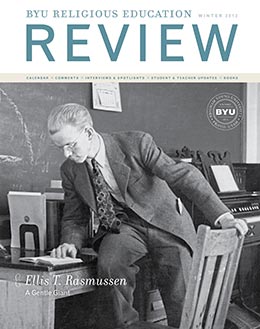"He will guide the destiny of this work as we all seek first to build up the kingdom of God and establish his righteousness."
My experience as a student enrolled in religion courses at Brigham Young University was mind-expanding and soul-stirring. Professors like Paul Cheesman, Hyrum Andrus, Milt Backman, Dan Ludlow, and Robert Matthews, to name a few, changed my life: they helped me to recognize the depth and breadth and profundity of the Restoration, and they also modeled the role of the disciple-scholar in a manner that motivated me to search and dig and ponder and pray.
Twelve years after my first graduation from BYU, I met with the university for a hiring interview. I was welcomed into a room with President Jeffrey R. Holland, Provost Jae Ballif, and Vice Presidents Eliot Butler, Neal Lambert, and Noel Reynolds. I knew I would probably be asked to describe my doctoral studies at Florida State University, as well as what areas of research I would like to pursue. I was not unmindful of other matters: that this was the Church’s flagship academic institution; that it was supported generously by the precious tithing funds of the Church, the tithing of widows and little children; that parents throughout the Church sent their children to BYU to be inspired as well as informed, to receive an education that was as soothing and settling to the heart as it was stimulating to the mind; and that those appointed to teach in Religious Education needed to be, at their very core, men and women of both intellect and conviction.
As I sat in the meeting listening to counsel and responding to questions (including Eliot Butler’s favorite interview question, “What are some of the books you have read during the last year?”), it occurred to me that my mental constructions of what this interview would entail, as well as my mental rehearsal of answers to potential questions—was in many ways short-sighted. I was who I was. I was who I had become. I could not rush into brilliance. I could not pretend to be some impressive intellectual that I was not. I could not don the robes of academic respectability if, in fact, my years of reading and study and contemplation were inadequate. And I certainly could not present a false front of spirituality if my life to date did not reflect who and what I had become through decades of prayer, fasting, study, and service in the kingdom.
I returned to Brigham Young University as a member of the Ancient Scripture faculty in the fall of 1983 with a collage of otherwise contradictory feelings: overwhelmed, timid, enthusiastic, eager, hesitant, humble, and deeply grateful. My senior colleagues were kind and welcoming to me and even suggested that there just might be some contribution I could make. Three decades have passed, and the Lord has shed his tender mercies upon the staff and faculty of Religious Education in marvelous ways.
We are saddened yet encouraged as we watch the face of Religious Education faculty change with the passing of years. Some of our dear coworkers retire from active service and others complete their work on earth and take up their assignment in the postmortal world of spirits. We rest secure in the conviction, however, that God is in his heaven, that he is mindful of the needs of the young people of the Church who come to BYU, and that he will guide the destiny of this work as we all seek first to build up the kingdom of God and establish his righteousness (see Joseph Smith Translation, Matthew 6:38). Because of that conviction, the future is bright indeed.
Robert L. Millet
Director of Publications, BYU Religious Studies Center
